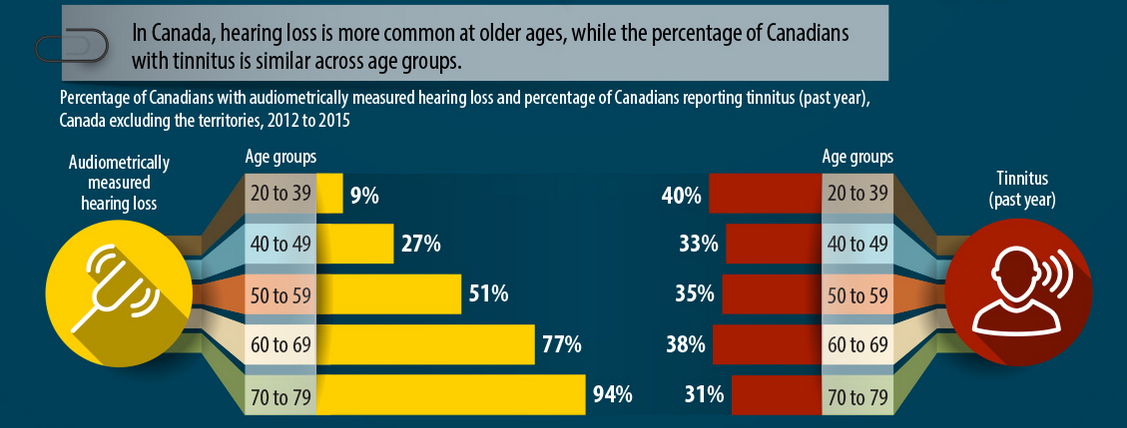Bourdonnement dans les oreilles : Cinq choses à savoir sur les acouphènes (en anglais seulement)
By Dekota Clayton, B.Sc., M.Sc. Aud-Reg
Hear Right Canada Nova Scotia Inc.
Do you or a loved one hear ringing in your ears? It could be tinnitus. This article will review five things you should know about tinnitus and how to manage the symptoms.
#1 What is tinnitus?

Tinnitus is the perception of sound in the absence of an external sound source. The perception of the sound can vary from person to person but is often described as a ringing, buzzing, hissing, clicking, chirping, or pulsing. It can be present in one or both ears, either sometimes or all the time. The severity of the symptoms can be mild or bothersome with tinnitus often being most noticeable in quiet situations.
In 2019, Statistics Canada estimated that over 9 million adult Canadians had experienced tinnitus within the past year. The incidence of tinnitus was the same across all age groups. Interestingly, tinnitus was reported as bothersome for 7 percent of adult Canadians, impacting sleep, concentration, and mood.
#2 What causes tinnitus?
The exact cause is unknown, but we do know that tinnitus is not a disease. It is a symptom that tells us something is wrong in the auditory system. The auditory system includes the ear, the auditory nerve (which connects the ear to the brain), and the parts of the brain that process sound. Sometimes tinnitus can be caused from simply being plugged with earwax, but it could also be the result of these health conditions:
- Noise-induced hearing loss
- Ear and sinus infections
- Diseases of the heart or blood vessels
- Thyroid abnormalities
- Certain medications
- Anxiety and stress
- Head and neck injuries
#3 What causes tinnitus to fluctuate?
Oftentimes, a fluctuation in tinnitus perception can be random and is likely caused by a combination of internal or external factors. For most people, the biggest factors include sleep, stress, and anxiety but a few other common factors are listed below:
- Sleep deprivation
- Anxiety, depression, and stress
- Loud noise exposure
- Certain medications, supplements, and vitamins
- High salt or high sugar diet
- Smoking, alcohol, and caffeine
- Allergies or weather changes
- TJM disorders (jaw pain and clicking)
With such a broad list of factors, it is important to keep track of the things that increase your tinnitus perception, as the above list does not impact everyone equally.
#4 What is the link between tinnitus, anxiety, and stress?
Typically, tinnitus is not a serious problem but it can trigger a strong emotional reaction. We know that this reaction comes from our limbic system, the emotional center of our brain. The limbic system helps to generate the fight or flight/acute stress response, a response to a perceived threat. For example, imagine you are watching TV and a sound comes on that is just like your tinnitus. This can cause you to immediately notice your own tinnitus in a negative way, possibly even louder than before. Naturally, at that moment we just want the tinnitus to go away. By trying to push it away, we are essentially fighting with our own fight-or-flight response. This can lead to increased anxiety and stress which can lead to poor quality of sleep.
#5 What treatment options are available?
Presently, there is no cure for tinnitus, but audiologists can offer several treatments to help manage the symptoms. The treatment will depend on the severity and how it impacts your quality of life. Listed below are some common treatments to provide the best results specific to the individual’s needs, which are often used in combination with one another.
Hearing aids are often helpful for those with hearing loss and tinnitus. The better you are hearing, the less you may notice your tinnitus.
Counseling helps you understand and learn how to live with your tinnitus. Understanding how your body reacts to tinnitus can make it easier for you to manage your symptoms.
Sound therapy teaches you how to use other sounds to cover up your tinnitus.
Tinnitus habituation is designed to help the brain relearn. This approach combines counseling and sound therapy.
Tinnitus is common among adults in Canada. The sound perception and severity may vary from person to person. There are many different treatment options available that focus on managing your tinnitus symptoms, and it is important to have a customized treatment plan for your specific needs. If you or a loved one has tinnitus, speak with your doctor or audiologist to better understand how to manage the symptoms and improve your quality of life.






